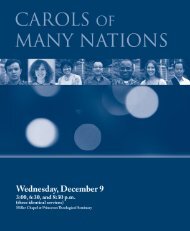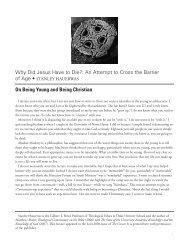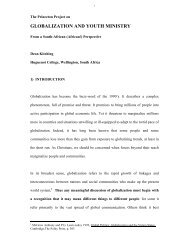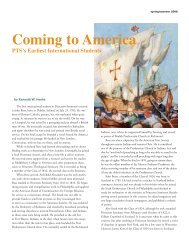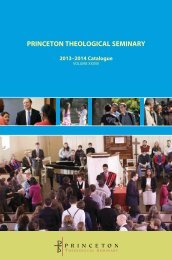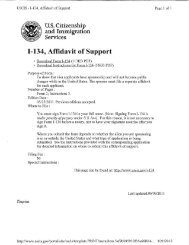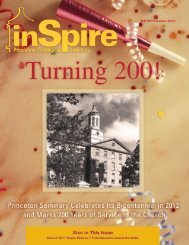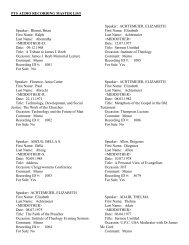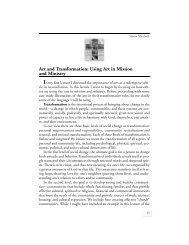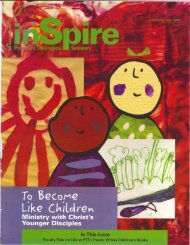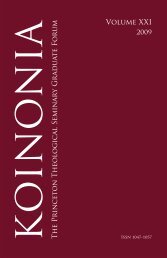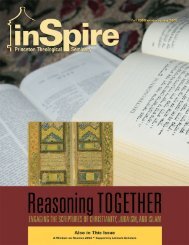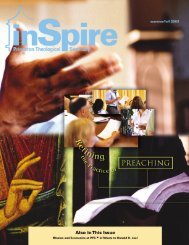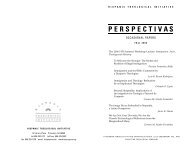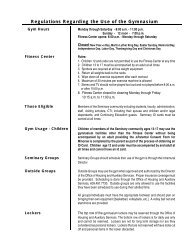Class notes - Princeton Theological Seminary
Class notes - Princeton Theological Seminary
Class notes - Princeton Theological Seminary
You also want an ePaper? Increase the reach of your titles
YUMPU automatically turns print PDFs into web optimized ePapers that Google loves.
fall 1997<br />
~end things<br />
•<br />
~D RE: Dead Sea Scrolls<br />
~~[ili]~<br />
Sent:<br />
To:<br />
Subject :<br />
File Edit Uiew Insert Format Tools<br />
. .<br />
..<br />
November, 199702:22 a.m.<br />
<br />
Late Night Thoughts on the Essenes<br />
Compose<br />
-cwebmasrer»: As you rhink abour the<br />
scrolls, and then abour email or rhe web,<br />
whar do you rhink abour the "perceived"<br />
permanence or longeviry of a piece of<br />
wriring? Whar did that mean to rhe<br />
scroll authors, and whar does thar mean<br />
to us now?<br />
-cscrollrnasrer»: When the Jews living<br />
ar Qumran rhoughr abour the furure,<br />
rhey believed rhey were living in ir.<br />
When they hid the scrolls from the<br />
Roman soldiers in the spring of 68<br />
A.D., rhey probably had mixed feelings.<br />
Some marched our ro meet the enemy<br />
rhinking that rhis was the final barrie,<br />
which would bring an end to all normal<br />
rime. Orhers may well have rhoughr char<br />
someday they would rerum ro recover<br />
the scrolls. They had concealed them<br />
carefully, wrapping each scroll in a linen<br />
clorh (we have some) and then placing it<br />
in a clay jar whose lid would be sealed.<br />
nor be anorher 2,000 years-and<br />
cerrainly no 1947 and 1997.<br />
-cwebmaster»: Can you rell somerhing<br />
abour the people who wrore the scrolls?<br />
Our language, even in rhis email, rells<br />
somerhing abour us, bur it will evaporare<br />
in a few minures ...<br />
cscrollmaster»: When I hold a piece of<br />
learher on which Hebrew was penned<br />
over 2,000 years ago 1 somerimes rhink<br />
abour the person who prepared the skin<br />
for writing, and the one who bent over<br />
and wrore the Hebrew consonants.<br />
Some of rhe scribes srrike me as rarher<br />
old wirh failing eyesighr. There were no<br />
glasses then, and rhe misrakes I see are<br />
the ones I would have made. Words are<br />
erased, crossed our, and somerimes other<br />
words are written above the line. The<br />
humaniry of the anonymous ancienr<br />
scribe comes ro life.<br />
translate ir. Ler me explain.<br />
You and I see from roughly<br />
400 to 700 waves of Iighr.<br />
The new digiral Kodak<br />
camera my colleagues at<br />
Xerox use sees from 100 to<br />
1000 waves insrantaneously.<br />
For example, there is a<br />
copy of Daniel from 100<br />
BCE. Most of rhe letters on<br />
ir are impossible ro read.<br />
Then, click and click-rhe<br />
sound of digirizing and<br />
compurers-in three seconds<br />
I can see, read, and<br />
interpret what no eye has<br />
seen for 2,000 years.<br />
cwebmasrerc-: Thar is<br />
amazing. One lasr quesrion:<br />
what is your hope for technology,<br />
the web, and the<br />
Dead Sea Scrolls?<br />
Neal Magee ('976) is the<br />
webmaster at <strong>Princeton</strong><br />
<strong>Theological</strong> <strong>Seminary</strong>.<br />
'"<br />
°E<br />
:z: "<br />
c<br />
><br />
ẹ•<br />
o<br />
o<br />
~ọ<br />
t:<br />
Q.<br />
-cwebrnasrer»: So the grear care rhey<br />
rook in wriring/sroring/preserving the<br />
scrolls had to do wirh cosmological and<br />
rheological reasons as well as pragmaric<br />
prorecrion from the Romans?<br />
-cscrollmaster»: The Qumranires<br />
believed rhar rhey were in rhe wilderness<br />
preparing the Way ofYaweh and living<br />
ar the End of Time. Time was pregnant<br />
wirh meaning. Time had run our.<br />
-cwebmaster»: How do you think rhey<br />
mighr react knowing that we are reading<br />
them now, 2,000 years larer?<br />
-cscrollrnaster»: Such an idea would<br />
never have entered rheir heads. Furure<br />
for rhem was rhe presenr. There would<br />
cwebmasrer»: Now that is inreresring.<br />
I'm jealous of your chance ro hold the<br />
learher manuscriprs. I can't hold much<br />
of anyrhing I write for rhe web. One<br />
inreresring idea is rhar you are here in<br />
the U.S. holding somerhing buried in<br />
rhe Middle East, 2,000 years later, and<br />
ir srill has a srrong sense of purpose and<br />
passion for you. Even rhrough all that<br />
rime and distance, somerhing is transmined.<br />
A "message in a boule," so to<br />
speak. That's jusr been accelerared and<br />
made easy by email-rhere's no real<br />
time-distance barrier any more. How<br />
has rechnology helped you ger deeper<br />
inro the scrolls?<br />
-cscrollmasrer»: Very simply: only rechnology<br />
allows me ro see the ancienr<br />
words. Until I see somerhing, I can nor<br />
-cscrollrnasrerc-:To help the James H. Charlesworth<br />
professors here ar PTS... is the <strong>Seminary</strong>'s<br />
George L. Collord<br />
wirhour rechnology, we Professor of New<br />
can nor prepare the crirical Testament Language<br />
texts and rranslarions of the and Literature.<br />
Dead Sea Scrolls. Equally imporranr<br />
are scholars and assisranrs who dedicare<br />
rhemselves to labor-intensive research.<br />
We can now announce that mosr of the<br />
Bible (OT) has been accurarely rransmined<br />
to us over virrually 2,500 years.<br />
And in those days no one could xerox,<br />
phorograph, digirize, or computerize<br />
rhe dara. Having said that, I srill rip<br />
my har roward the Qumranires. They<br />
knew whar was really important: firm<br />
and roral commirmenr ro God and his<br />
approaching Kingdom (bur then, anether<br />
Jew made such a proclamarion his<br />
central message). I<br />
inSpire. 33



